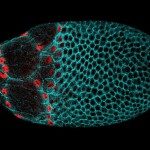Lien vers Pubmed [PMID] – 23213427
Biol Open 2012 Apr;1(4):376-84
Msx1 and Msx2 encode homeodomain transcription factors that play a role in several embryonic developmental processes. Previously, we have shown that in the adult mouse, Msx1(lacZ) is expressed in vascular smooth muscle cells (VSMCs) and pericytes, and that Msx2(lacZ) is also expressed in VSMCs as well as in a few endothelial cells (ECs). The mouse retina and choroid are two highly vascularized tissues. Vessel alterations in the retina are associated with several human diseases and the retina has been intensely used for angiogenesis studies, whereas the choroid has been much less investigated. Using the Msx1(lacZ) and Msx2(lacZ) reporter alleles, we observed that Msx2 is not expressed in the eye vascular tree in contrast to Msx1, for which we establish the spatial and temporal expression pattern in these tissues. In the retina, expression of Msx1 takes place from P3, and by P10, it becomes confined to a subpopulation of ECs at branching points of superficial arterioles. These branching sites are characterized by a subpopulation of mural cells that also show specific expression programs. Specific Msx gene inactivation in the endothelium, using Msx1 and Msx2 conditional mutant alleles together with a Tie2-Cre transgene, did not lead to conspicuous structural defects in the retinal vascular network. Expression of Msx1 at branching sites might therefore be linked to vessel physiology. The retinal blood flow is autonomously regulated and perfusion of capillaries has been proposed to depend on arteriolar precapillary structures that might be the sites for Msx1 expression. On the other hand, branching sites are subject to shear stress that might induce Msx1 expression. In the choroid vascular layer Msx1(lacZ) is expressed more broadly and dynamically. At birth Msx1(lacZ) expression takes place in the endothelium but at P21 its expression has shifted towards the mural layer. We discuss the possible functions of Msx1 in the eye vasculature.
